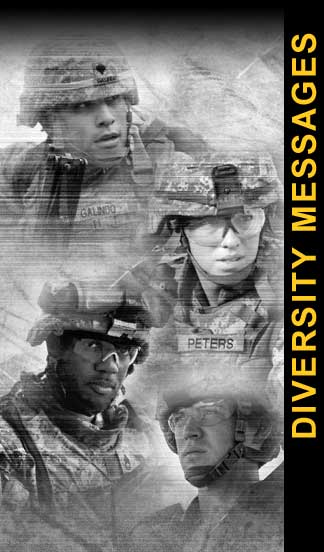
TAKE A SECOND LOOK
Every U.S. Army Soldier, Civilian and Family Member has a different background, culture, and thought process from which he or she can draw. When these separate differences are combined and work together, it contributes to an adaptive, culturally astute Army that further enhances our capabilities around the world. The stories featured above reveal what you may find when you take the time to look beyond our differences. So, stop. Take a second look. We’re all stronger for it.
Click on an image to get the full story.
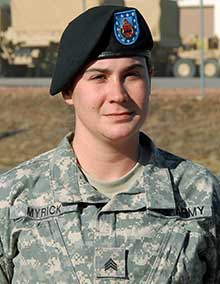
SGT COLLEEN MYRICK
SGT Colleen Mytrick certainly doesn’t look like your typical mechanic. Get to know her though, and you’ll see there’s nothing typical about this twice-deployed, mother-of-two squad leader who learned everything she knows about cars in the Army. Currently, she serves as the only female mechanic in a platoon of 42 Soldiers in the 2nd Brigade Combat Team, 4th Infantry Division at Fort Carson, CO.
While deployed in Iraq, she served as a mechanic and also went on patrols as a member of a Female Search Team (FiST). FiSTs are used throughout Iraq to prevent enemy forces from utilizing women to disrupt humanitarian missions and they ensure that the integrity of missions are performed within the culture, customs and courtesies of the Iraqi people.
Although she deployed with different units each time, she has fond memories from her time overseas.
“Even though both deployments were hard work and mission focused, every day was fun. It was a great chance to bond with other Soldiers, and I had great teams working alongside of me both times,” Myrick said.
When you approach life with an open mind, you’ll be surprised by what you can learn.
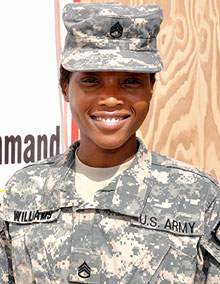
SSG ANYA WILLIAMS
As one of the historians cataloging the experiences and accomplishments of her unit in Afghanistan, SSG Anya Williams has been pleasantly surprised how a group of people from different worlds have come together to create a cohesive operation. These observations and information recorded by Williams for the 143rd Expeditionary Sustainment Command (ESC) will provide a road map for future missions and are drawn from a variety of sources.
“I wanted to meet different people and to test my mental and physical self beyond what the civilian world offered,” Williams said. “My deployment has been an adventure thus far, and I have accomplished a lot both physically and mentally.”
This Noncommissioned Officer credits her service with giving her leadership skills she wouldn’t have developed anywhere else.
What will your experiences teach you about the strength it takes to be a leader?
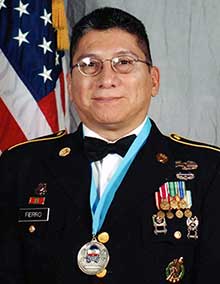
MSG GABRIEL FIERRO, SR.
Treating everyone for who they are, not what they look like, is a guide MSG Gabriel Fierro, Sr. uses both inside and outside of Army life. The self-proclaimed “cultural chameleon” has been able to use his blended American Indian and Hispanic heritages to better relate with both cultural groups on a regular basis.
Fierro frequently speaks Spanish to better communicate with Hispanic Soldiers and enjoys discussing warrior ethos of the Indian tribes with Native American Soldiers. Fierro is committed to helping all Soldiers, regardless of their heritage, prepare for Army life. “I want everyone to be treated for who they are, not what they look like,” said Fierro.
Fierro draws upon his own blended cultural background to emphasize the importance of being open-minded and accepting. He also teaches Soldiers to form opinions based on other’s actions, not their race or heritage.
What strength can you draw upon from your background?
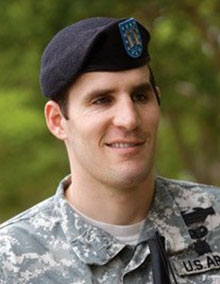
CPT SCOTTY SMILEY
CPT Scotty Smiley lost his eyesight through wounds suffered in combat. While Smiley recovered at Fort Lewis, Wash., WTU he remained focused on getting back to doing what he loved, serving his country in uniform. Smiley’s selfless service not only inspires fellow Soldiers, friends and family, it also inspired the United States Men’s Olympic Basketball Team. In 2007 he was asked to speak to the future gold medal winning team.
“We were trying to teach the team about selfless service. They not only heard what Scotty had to say, but they truly felt what he had to say,” said Mike Krzyzewski, Olympic team coach and legendary coach at Duke University.
The next time you hear about a Soldier being seriously wounded, don’t just assume that the injury is going to place limitations upon him or her. Smiley’s injury may have taken his sight, but it didn’t take his drive and determination.
Look inside yourself… WHAT IS YOUR STRENGTH?
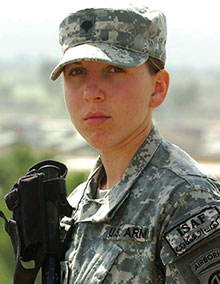
SPC MONICA BROWN
At first glance, Army SPC Monica Brown may seem like she lacks experience. Looks can definitely be deceiving though, as Brown is the first woman in Afghanistan to receive the Silver Star and only the second woman since World War II to receive our nation’s third-highest medal for valor. Brown ran through insurgent gunfire and used her body to shield wounded comrades — saving five Soldiers in the process. Her bravery under fire represents the finest tradition of heroism in combat.
What began as a routine security patrol soon turned into a chaotic scene involving an IED, small arms fire and mortar rounds. Brown, only 19 at the time, was within inches of the bullets being fired at her and the severely injured Soldiers she was treating.
“It became a huge commotion, but all I could let myself think about were my patients,” Brown said. “To say she handled herself well would be an understatement,” said Army SPC Jack Bodani a crewman on the patrol with Brown. “It was amazing to see her keep completely calm and take care of our guys with all that was going on around her. Of all the medics we’ve had throughout the year, she was the one I trusted the most.”
So the next time you see a young Soldier, remember to look beyond the surface. You might be surprised by what you find.
You didn’t see it, did you? WHAT ELSE ARE YOU MISSING?
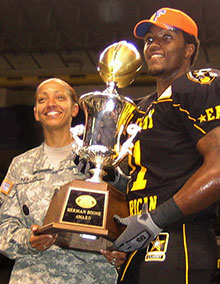
THE NIXON FAMILY
Command SGT MAJ Kenneth Nixon, Sr. and his wife Master SGT Fotini Nixon have a combined 50 years of Army service between them, including six deployments to Iraq and Afghanistan, four Bronze Star medals and numerous commendations.
Their commitment to the U.S. Army can only be rivaled by their commitment to their family. Recently Command SGT MAJ Nixon and Master SGT Nixon were among more than 85 Soldiers honored for their service at the 2009 U.S. Army All-American Bowl. Despite their own tremendous accomplishments within the Army, the Nixons were more interested in celebrating the accomplishments of their son, Xavier.
Xavier Nixon is one of the top-ranked high school offensive linemen in the county. Due to his father’s deployment in Afghanistan, the All-American Bowl game was the first game Command SGT MAJ Nixon had the opportunity to see all season. Xavier provided his parents with another proud moment during his father’s brief leave time when he announced his intentions to attend the University of Florida. For a family who values each other and school before sports, this was the opportunity to celebrate all.
What is your family background?
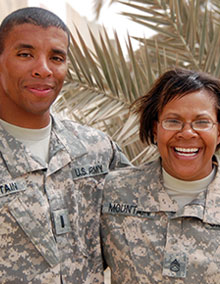
THE MOUNTAIN FAMILY
Serving their country in the U.S. Army has become a family tradition for the Mountains. 1LT Robert Mountain III is the most recent member of the Mountain family to serve in the Army. He followed the example set by several family members including his mother, father and grandfathers.
“I wanted to continue their legacy and simultaneously fulfill my desire to serve my nation,” 1LT Mountain added. Today 1LT Mountain is serving alongside his mother in Iraq; both are members of the 4th Brigade Combat Team, 1st Armored Division.
Although the mother and son pair are not stationed at the same location in Iraq, they are able to keep in touch. “We frequently email one another and I try to give her a call on a weekly basis,” 1LT Mountain said.
While any deployment is challenging, the Mountains have found comfort in serving together. “It’s really cool,” 1LT Mountain said of his deployment with his mom, Staff SGT Mountain. “It makes being deployed much easier for both of us.”
How many generations from your family have served?
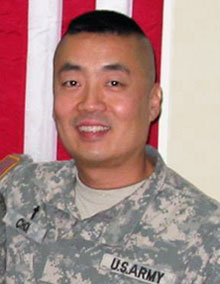
CPT ED CHOI
Army Chaplain CPT Ed Choi takes great pride in serving as a father to his three children and as a father figure to the Soldiers he counsels. CPT Choi and his wife, Kathryn, share a Korean heritage and want to pass down the lessons and values their own parents taught them.
Even though the Army has presented frequent transitional challenges for his family during deployment and relocation every two to three years, the Chois are committed to maintaining a consistent home life for their children. Despite challenges, CPT Choi believes the military has many benefits for children. “A lot depends on the parents and how they help their children adapt,” said Choi.
The Chois were recently pleased to learn they will be stationed in their native land of Korea. The couple was especially excited to have the opportunity to teach their children their native language and immerse them in their heritage. CPT Choi is proud that his children, Titus (13), Faythe (12) and Emily (8), have been able to travel and experience more than many children their age.
What can you learn from your family’s heritage?
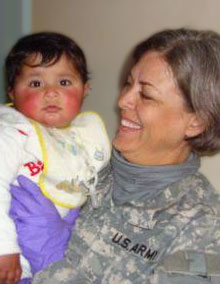
CPT JANET ROSE
CPT Janet Rose took a less than traditional path to join the ranks of the U.S. Army. She always felt an inner calling to serve her country, but she set aside thoughts of serving in the military to focus on raising her three children and establishing a successful nursing career. After 20 years in the medical field, the call to serve was still with her. So at a time when the Army was in dire need of qualified nurses and doctors, Rose joined the Army Reserve at the age of 48.
The 20 years Rose spent as a nurse made her a valuable resource at a time when the Army needed her most. While deployed to Diyala Province, Iraq, many of her missions were directly tied to her civilian and Army medical experience. She helped establish a supply line to provide much-needed medicine to nine hospitals throughout the province and worked with local government officials to encourage Iraqi doctors and nurses to return to their jobs.
Her commitment to improving quality of life in Diyala Province did not go unnoticed and she was awarded the Bronze Star medal for her extraordinary contributions.
How does your background contribute to the Army?
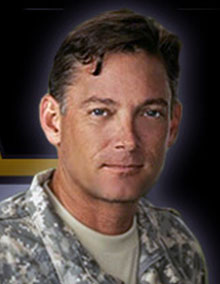
1LT TIM KEEGAN
When 1LT Tim Keegan joined the Army he brought more than two decades of professional credentials with him, including three years that he served as a U.S. Army Reserve (USAR) Ambassador. He even had to obtain an age waiver when the maximum was raised to 42.
While he attended Military Intelligence Officer Basic Course at age 44, Keegan was often surrounded by peers 20 years younger than him. The age disparity led Keegan to become a mentor to the young officers in his class. He formed lasting friendships with many of these younger officers that extend beyond the military.
The 48-year-old lieutenant admits that due to his age and prior civilian experience, he was able to work closely alongside senior commanding officers while in Afghanistan — something that most lieutenants do not have the opportunity to do.
“Due to my civilian background and experience, I was given a certain amount of latitude to do what needed to be done without excessive supervision. With age generally comes wisdom; I had to demonstrate that I was capable, which in turn generated confidence and trust with my superiors,” said Keegan.
How does your experience benefit others?
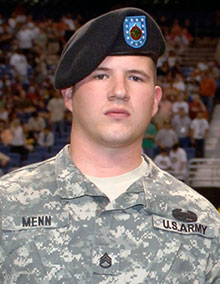
STAFF SGT KALEB MENN
As a child, Staff SGT Kaleb Menn always dreamed of serving in the Army. Since enlisting, he is grateful for the opportunities the Army has given him, and in turn, has devoted himself to helping others both in his unit and in his community.
Although he had already deployed in support of Operation Iraqi Freedom, a year later Menn volunteered for a second year-long tour to Iraq. His second tour overseas gave him a greater respect for the locals and a more profound understanding of the overall mission in Iraq. In recognition of his meritorious service during the deployment, Menn received a Bronze Star.
As a civilian, he works as a Residential Assistant for a non-profit organization in Illinois that seeks to help the developmentally disabled and mentally ill in their everyday lives. Though his job as a civilian and his role in the Army are very different, Menn enjoys that both allow him to help people.
How well do you understand others?
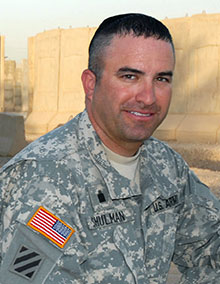
CPT ANDREW SHULMAN
As one of only a handful of Jewish Chaplains in the Army, CPT Andrew Shulman has been called on to support the religious needs of many Soldiers, including those outside of his faith.
While deployed in Iraq, Shulman has performed the Passover Seder for Soldiers, as well as Jewish Iraqi Civilians and Jewish members of the State Department. Shulman was stationed at Camp Victory, but routinely went to bases to meet with Jewish Soldiers in need of guidance and religious support.
Shulman said he wanted to be the standard bearer to show other Soldiers that it was possible to keep Jewish traditions while serving overseas. Shulman kept kosher, meaning he stayed within the Jewish dietary restrictions such as abstaining from eating pork products and not mixing meat and dairy products. He says although the Army had kosher MREs and the base dining facilities had kosher options, his family and friends sent him care packages with food to round out his choices.
What do you know about the faith preferences of others?
